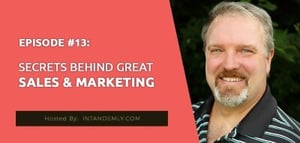Posted by Todd Hockenberry ● Mar 14, 2017
How a 27-Year-Old Manufacturing Company Grew Sales by $1M in 1 Year – Part 3
Last fall I had the opportunity to sit down with the Secrets Behind Great Sales and Marketing podcast and talk about the amazing success one of our clients, Tube Form Solutions, has had implementing an inbound marketing approach.
 You can listen to the full interview here, but I know that sometimes it’s easier to sit down and read rather than listen to a story. I’ve broken the transcript of that conversation up into 3 posts for those of you who fall into the read rather than listen camp. This is the third part of that series, with links to the previous two parts below.
You can listen to the full interview here, but I know that sometimes it’s easier to sit down and read rather than listen to a story. I’ve broken the transcript of that conversation up into 3 posts for those of you who fall into the read rather than listen camp. This is the third part of that series, with links to the previous two parts below.
Part 3
Sampath M.: Okay. How much did they actually really believe in inbound and inside selling in 2016?
Todd H.: They're believing more and more in it every day. October was their best month ever for lead generation and traffic on the website. Their appreciating it and understanding it more and more all the time. In the business they're in, there's trade shows and trade journals that are still very influential and are the kind of go-to places for information about their products.
One of the things we've done, is we've taken the ideas of inbound and started to apply them to things like trade shows, and trade journals, and trade e-newsletters that come out from these trade publications. Instead of just running ads that say "We have these machines with these specs", we say "Download our calculator, so that you can understand the bend radius for a tube", or "Download our guide to specifying tooling; all the questions you need to ask", or "Download our introductory guide to tube bending; everything an engineer needs to know", things like that.
Instead of advertising product, they're advertising their expertise, and they're seeing a significant increase in their ROI from things like trade shows and investments in trade magazines and trade publications.
What's interesting is by creating this customer focused content, we now get asked on a regular basis to contribute editorial content to these magazines, because we're actually out there doing it and creating this content all the time. It give us this connection between traditional media and traditional marketing and more of the inbound and access to these audiences, because we're being helpful and creating this editorial content.
We still do some banner ads for them, which have been surprisingly successful. I think because we've used inbound ideas; instead of again saying, "Click here to see my product", we say, "Click here to download the calculator." It's not even talking about the products, it's like we're going to help you first. We drive a lot of traffic that way.
We talk about inbound and outbound, but the reality is it's all marketing. If you change your mindset about the buyer journey and how buyers are changing, whatever channel you're using for your marketing, if you're adopting that mindset, and those beliefs, and that approach then I think you're going to be more successful.
Sampath M.: Right, that's actually making sense. I think as we come to an end of the show, I think my last question would be; what are the key takeaways to other similar manufacturing companies that are kind of struggling with sales? Also, I think majority of the manufacturing companies or the marketing people over there are not as tech savvy as say an IT company. Keeping that in mind, what would be your final tips?
Todd H.: I think the final tips are the big ones. I think the big thing is that manufacturing companies and industrial companies in particular need to recognize that buyers are different, and the process that they go through to buy products and services has changed. Too many of them still have what I call a catalog website; their website is just a listing of all their products, or "Here's the equipment we have in our shop." Nobody cares, be helpful.
I think a lot of sales people haven't even really considered marketing ... Excuse me, a lot of these types of companies haven't even really considered true marketing. Marketing is the people that put together the trade show booth, or put together a brochure, a handout. The ideas of real marketing, and trying to really understand the whole buyer journey and market across lots of channels using email, and social media. and content I think is really foreign to many manufacturing companies.
I think what the key takeaway is that companies, and I don't think it's just B2B, I think it's all companies need to recognize that things are different. In the B2B world for example, well over 90% of all the purchases start with an internet search; somebody's going out and researching.
We found that in our research, in our work with companies, that even people that are loyal buyers of their products start with an internet search. Even if they are intending to buy from a company, they still go out and look at competition, and look at the potential competitors, or pricing, or looking for new features or new technologies.
I had a great story; if you'll indulge me, I'd like to tell you a quick story. It actually was Tube Form Solutions, they did an open house not too long ago. I was there, and a gentleman came up to the owner of the company and said, "Hey, I need to talk to one of your sales guys. I'm looking for a quote on this new product." It was about a half a million-dollar product. He said "I've been looking at this online, and I've narrowed it down to you and one other company. I'm ready to talk about a price."
The owner about fell over. He said, "I've known you for years, why didn't you come up to us and talk to us first?" He said, "Well, I just did my research online first. I knew I wanted to consider you, but you had what I wanted and I have one other company, so it's between you and them." Their customer already, who had already been buying from them, never called them the first day, didn't ask them for specs, didn't ask them for a quote, didn't ask them for anything. They did their research online first, and then narrowed it down, and then asked them for a quote.
I just thought that was very instructive, and I think that's very common. Again, I think that shows that a large part of the buying process can be completed before prospects ever want to talk to your sales person. They want to do their homework and research, and look and see what their options are, and educate themselves first many times before they want to talk to a sales person. Again, a big change in the buyer.
One of the other pieces of that is, a large percentage of sales then will go to the first company that's helpful. If most people or a vast majority of people start online looking for information, and a lot of the process is over before they talk to a sales person; if you're not in that up-front part of the process, your chances of succeeding are going way down.
My takeaway would be manufacturing and industrial companies need to understand their marketplace, and start to think about how their buyers are different, and change their approach to getting in front of them, and how they market and sell their company.
Sampath M.: Yeah, like the way Bill Gates says, "If you're not online, you'll be out of business in a few days."
Todd H.: Exactly. I've had people say to me, "Our customers aren't looking for our products online." I just laugh, because I don't even have to do my research; the answer is always yes, your customers are out there looking at you online, promise you.
Sampath M.: Yeah, I completely agree. Todd, I think all of your answers were extremely valuable. I think they've been very specific and addressed well to manufacturing companies, which I personally know are kind of struggling with more than sales; about how to create a marketing engine for themselves. They're absolutely clueless. I'm very confident that this podcast would be an answer to all those companies. It was such a pleasure to have you on the show.
Todd H.: Pleasure was all mine, thank you for having me.
Sampath M.: Thank you Todd.
Want the Full Story?
Part 1 can be found here. Part 2 can be found here.
However, this article is an excerpt from an interview I did with the Secrets Behind Great Sales and Marketing podcast. The interview is about 26 minutes long and you can listen to the whole thing here. [Edit: Sadly this podcast is no longer available online.]
Topics: Manufacturing





